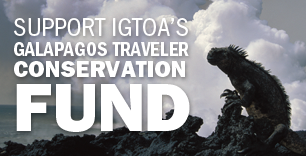Search
Tag Cloud
Subscribe
The Galapagos National Park Entrance Fee Increase Is a Step in the Right Direction

On Saturday, February 24, the governing council of the Galapagos Islands voted by a five to four margin to increase the National Park entrance fee from $100 to $200 for international visitors and from $6 to $30 for Ecuadorian nationals. The new fees are scheduled to take effect in six months.
For many years, the International Galapagos Tourist Association (IGTOA) has advocated for an increase in the Galapagos National Park entrance fees as a way to raise much needed funding for operating and managing the park and helping to control the growth in overall tourism numbers in this fragile world heritage site. Fees to enter the Park have remained unchanged since the 1980s and are far lower than those charged by comparable national parks around the world. Serengeti National Park, for example, charges international visitors a minimum of $143.50 per person per day in park and concession fees and taxes. To visit Rwanda’s Volcanoes National Park to track gorillas, visitors pay $1,500 per day. The Galapagos charges a fixed amount of $100, regardless of the length of the visit. Many visitors spend from 4-8 days in the Park, yet only pay $100 for the privilege.
The Galapagos National Park is widely considered one of the world’s premier nature and wildlife destinations, yet hasn’t adjusted its entry fee to keep pace with inflation in more than 30 years. It is our hope that the additional funds raised will be used to improve park management and step up much-needed conservation efforts as is mandated by the 1998 Special Law for Galapagos. Managing effective biosecurity protocols, maintaining complex trail systems, patrolling the vast Galapagos Marine Reserve from illegal international fishing, and combating potentially catastrophic invasive species are very expensive undertakings that need to be properly funded if the Galapagos National Park as we know it is to continue to thrive.
The ability to visit the Galapagos Islands is an incredible privilege. As the world’s most ecologically intact oceanic archipelago, the Galapagos offers visitors a truly unique opportunity to experience the natural world as it once was and to come face-to-face with creatures that exist nowhere else on Earth. The park fee should reflect the value of this unique experience. Keeping it artificially low and at a fraction of what other internationally acclaimed nature destinations around the world charge sends the wrong message to visitors and devalues their experience.
Another potential benefit of the new increase is that it will help dampen the explosive and unsustainable growth in tourism that continues to pose a real threat to the islands. In 2007, UNESCO took the extraordinary step of placing the Galapagos on its List of World Heritage in Danger, citing uncontrolled tourism growth and the lack of a clear plan to address it as one of the factors in its decision. Although it was removed from the list in 2010, tourism growth has continued unabated. In 2023, the islands received nearly 330,000 visitors, up from 161,000 in 2007. One hundred percent of this increase is due to the ever-growing popularity of land based tourism in the islands. Unlike ship based tourism, which has been carefully regulated since 1998, with strict limits placed on the size and number of passenger vessels allowed to operate, land based tourism has gone largely unregulated. A proliferation of new hotels, hostels, and other types of overnight rentals, many of which are unlicensed and unregulated, has drastically increased the overall visitor capacity of the islands and has led to an increase in low cost, self organized tourism that often contributes little to the local economy while straining local resources and inreasing shipments of goods from the mainland, a primary vector for the introduction of new invasive species.
IGTOA understands that both land based and ship based tourism models have a role to play in Galapagos. Many IGTOA members offer sustainable land based tours and we recognize that land based tourism is an important part of the Galapagos tourism economy. But the lack of effective regulation or limits on land based tourism and the proliferation of low budget, self organized tourism has been the key driver of unsustainable tourism growth. The future of land based tourism in the Galapagos should be limited and regulated, just as it is for vessel based tourism.
We strongly believe the increased park fees are a step in the right direction and a promising signal that Ecuador’s new government is willing to tackle this difficult and politically sensitive issue head on.






